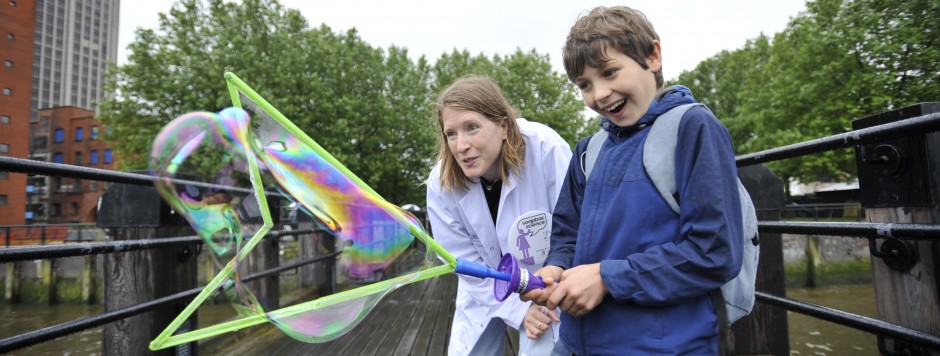 Dr Rebecca Thompson (@Bex_16) is a researcher at the Astbury BioStructure Laboratory, University of Leeds, helping other scientists to use state-of-the-art electron microscopes to look at the protein machines that drive life. Rebecca will be standing on our soapbox on the 18th of June, in Newcastle, to talk about “Seeing proteins: what the most powerful microscopes in the world are telling us about how our cells work”
Dr Rebecca Thompson (@Bex_16) is a researcher at the Astbury BioStructure Laboratory, University of Leeds, helping other scientists to use state-of-the-art electron microscopes to look at the protein machines that drive life. Rebecca will be standing on our soapbox on the 18th of June, in Newcastle, to talk about “Seeing proteins: what the most powerful microscopes in the world are telling us about how our cells work”
SS: Rebecca, how did you get to your current position?
RT: I did my undergraduate degree in molecular biology at Cardiff University, graduating in 2011. I enjoyed my degree, and especially working in the lab during my final year, and so decided for me a PhD was the natural next step. I was lucky enough to get a place on the University of Leeds Wellcome Trust PhD scheme ‘The Molecular Mechanism of Biological Processes’, which enabled me to do three rotations in different labs in my first year. This gave me the chance to try out different labs and work on different projects, using a range of methods. My second rotation was using electron microscopy to look at misfolded protein structures called amyloid fibrils. It only took me a few weeks to become completely hooked on using electron microscopes! They are such amazing machines, letting us literally see the tiny protein machines that drive our cells. I went on to do my PhD using electron microscopes to study amyloid fibrils, and how they interact with parts of the cell, as well as the structure viruses. This PhD gave me lots of experience using electron microscopes. It was then a case of ‘right place right time’, as finishing my PhD coincided with a huge investment in electron microscopy at Leeds, and the opening of a position to help support scientists to use electron microscopy in their research. I applied, and I was lucky enough to get the position! I’m only 4 months in, but so far I’m really enjoying it, working on lots of different projects at the same time keeps me on my toes!
SS: What, or who, inspired you to get a career in science?
RT: I am lucky to have wonderful parents who supported and encouraged me to pursue the things I find interesting. For me, this was basically always science! Aged 7 I was set on being an astrophysicist, by age 11 I wanted to be a chemist. During my early teens I discovered a whole host of excellent popular science books, such as those by Matt Ridley and Richard Dawkins, and these hooked me on genetics and evolutionary biology, and drove my choice to study Molecular Biology at university.
SS: What is the most fascinating aspect of your research/work?
RT: Getting to look at stuff in the electron microscope! Its amazing to look at different proteins, viruses and parts of cells.
SS: What attracted you to Soapbox Science in the first place?
RT: I really enjoy talking to people about science generally, and especially my research. I’ve organised and taken part in many public engagement events in museums and with school groups visiting the university, but I think Soapbox Science is going to be very different experience. Its an opportunity to take science outside of a museum, or school, or university, out into the real world!
SS: Sum up in one word your expectations for the day – excitement? Fear? Thrill Anticipation?
RT: Excitement, with a little trepidation!
SS: If you could change one thing about the scientific culture right now, what would it be?
RT: Perhaps this is not a change to scientific culture, but the media’s representation of how science works. Documentaries commonly say ‘we did a scientific experiment to test X’, when really it’s not a science experiment at all, but an anecdotal example (for example, no control groups). I think this misrepresents how science works.
On the flip side, I think many scientists need to be more willing to make the effort to make their research accessible and engage with the public, both directly and through the media. I think some scientists perhaps don’t see the value in public engagement work, perhaps because they think people wont be interested. However, my experience is that ‘the public’ are on the whole genuinely interested in understanding scientific research, and get as excited as I do about the latest science.
SS: What would be your top recommendation to a female PhD student considering pursuing a career in academia?
RT: I only finished my PhD a few months ago, but my advice to anyone looking to start a PhD would be to consider not only the project, but also the wider environment, including the people you will be working for and with, opportunities to pursue other interests in a supported way (such as public engagement!), and wider training. I had a fantastic experience during my PhD (despite having a project which didn’t yield as many results as I would have liked!) thanks to a great set of supervisors who were supportive throughout and opportunities to get involved in a range of activities, from public engagement, to teaching, and even a 3-month internship in science policy.
